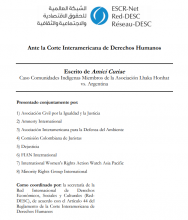
Amicus presented in indigenous rights case before Inter-American Court
This past March, eight members—Asociación Civil por la Igualdad y la Justicia, Amnesty International, Asociación Interamericana para la Defensa del Ambiente, Comisión Colombiana de Juristas, Dejusticia, FIAN International, International Women’s Rights Action Watch - Asia Pacific, and Minority Rights Group International—submitted an amicus brief (in Spanish) in the Case of the Indigenous Communities Members of the Lhaka Honhat Association vs. Argentina before the Inter-American Court of Human Rights.
The amicus encouraged the Court to build on its emerging jurisprudence and apply the autonomous rights to a healthy environment, cultural identity, food, and water under Article 26 of the American Convention on Human Rights. The arguments were raised in the context of indigenous peoples’ rights to self-determination and development.
This case provides the Court with the opportunity to rule for the first time on the autonomous rights to a healthy environment, cultural identity, food, and water. It is also the first indigenous land rights case against Argentina before the Court.
The amicus opens with an analysis of the Court’s jurisdiction and recent approach to adjudicating rights under Article 26 of the American Convention. It then uses the Court’s interpretive practices to derive the autonomous rights to a healthy environment, cultural identity, food, and water and outlines accompanying state obligations. The submission also discusses the importance of adjudicating such rights on their own terms, separate to civil and political rights.
The amicus also sets out essential standards attaching to these Article 26 rights, drawing on standards from other regional and international human rights bodies.
The amicus concludes by placing the discussion within the framework of indigenous peoples’ rights to self-determination and development, recalling state duties to seek indigenous peoples’ free, prior, and informed consent concerning activities that could harm their rights, including in relation to ancestral land and natural resources.

